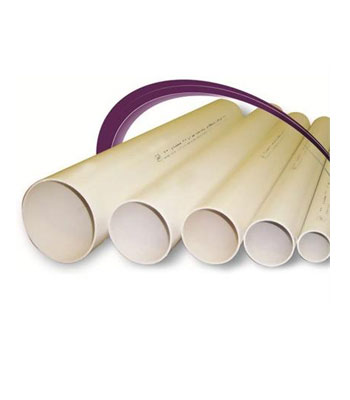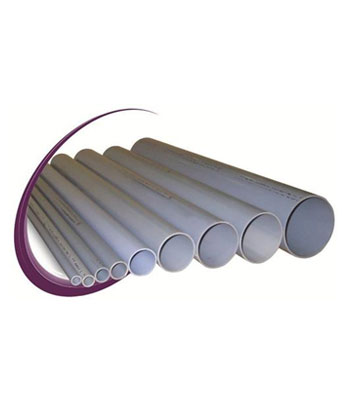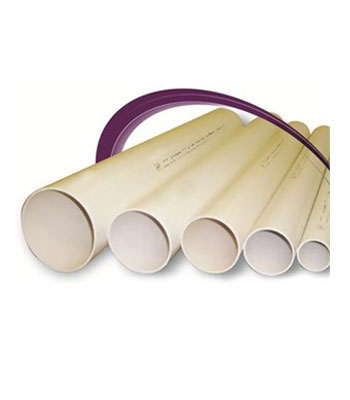UPVC Rainwater Pipe
0,00 €Introduction
Rainwater pipes are used to transfer the rain and snow water from roof of the buildings. Polyvinyl chloride (PVC) is kind of useful plastics in construction and buildings. By adding lubricants, this material will become softer and more flexible than plastics. If no lubricant and plasticizer is added, UPVC is obtained. Chemical resistance of this polymer makes it interesting for a variety of industries especially pipe industry. Usage of UPVC includes sewer pipelines, water mains and potable water services, power and telecommunication cables. These pipes are supposed to have chemical and corrosion resistance, high elasticity module and toughness, long term tensile strength and abrasion resistance, but they may become brittle exposed to cold atmosphere. In addition, they tend to deform and lose their strength in high temperature conditions. These pipes have been given better properties by addition of nanoparticles.
UPVC Rainwater Pipe
0,00 €Introduction
Rainwater pipes are used to transfer the rain and snow water from roof of the buildings. Polyvinyl chloride (PVC) is kind of useful plastics in construction and buildings. By adding lubricants, this material will become softer and more flexible than plastics. If no lubricant and plasticizer is added, UPVC is obtained. Chemical resistance of this polymer makes it interesting for a variety of industries especially pipe industry. Usage of UPVC includes sewer pipelines, water mains and potable water services, power and telecommunication cables. These pipes are supposed to have chemical and corrosion resistance, high elasticity module and toughness, long term tensile strength and abrasion resistance, but they may become brittle exposed to cold atmosphere. In addition, they tend to deform and lose their strength in high temperature conditions. These pipes have been given better properties by addition of nanoparticles.
UPVC Rainwater Pipe
0,00 €Introduction
Rainwater pipes are used to transfer the rain and snow water from roof of the buildings. Polyvinyl chloride (PVC) is kind of useful plastics in construction and buildings. By adding lubricants, this material will become softer and more flexible than plastics. If no lubricant and plasticizer is added, UPVC is obtained. Chemical resistance of this polymer makes it interesting for a variety of industries especially pipe industry. Usage of UPVC includes sewer pipelines, water mains and potable water services, power and telecommunication cables. These pipes are supposed to have chemical and corrosion resistance, high elasticity module and toughness, long term tensile strength and abrasion resistance, but they may become brittle exposed to cold atmosphere. In addition, they tend to deform and lose their strength in high temperature conditions. These pipes have been given better properties by addition of nanoparticles.
UPVC Sewer Pipes
0,00 €Introduction
Nowadays, the most of sewage pipes are made of UPVC. Polyvinyl chloride (PVC) is one of the most widely used plastics in construction and buildings which has various applications. Addition of lubricants makes this material softer and more flexible than plastics. If no lubricants or plasticizers are added to it, the resulting material is known as UPVC. The chemical resistance of this polymer has made it suitable for wide applications in different industries, especially the pipe industry. These pipes are supposed to have chemical and corrosion resistance, high elasticity modulus and flexibility, long-term tensile strength, high strength to weight ratio and wear resistance. However, it should be noted that these pipes can be fragile when exposed to cold weather. Besides, they can be deformed and lose their strength because of high temperature. Addition of appropriate nanoparticles can obviate these deficiencies and improve their properties.
UPVC Sewer Pipes
0,00 €Introduction
Nowadays, the most of sewage pipes are made of UPVC. Polyvinyl chloride (PVC) is one of the most widely used plastics in construction and buildings which has various applications. Addition of lubricants makes this material softer and more flexible than plastics. If no lubricants or plasticizers are added to it, the resulting material is known as UPVC. The chemical resistance of this polymer has made it suitable for wide applications in different industries, especially the pipe industry. These pipes are supposed to have chemical and corrosion resistance, high elasticity modulus and flexibility, long-term tensile strength, high strength to weight ratio and wear resistance. However, it should be noted that these pipes can be fragile when exposed to cold weather. Besides, they can be deformed and lose their strength because of high temperature. Addition of appropriate nanoparticles can obviate these deficiencies and improve their properties.
UPVC Sewer Pipes
0,00 €Introduction
Nowadays, the most of sewage pipes are made of UPVC. Polyvinyl chloride (PVC) is one of the most widely used plastics in construction and buildings which has various applications. Addition of lubricants makes this material softer and more flexible than plastics. If no lubricants or plasticizers are added to it, the resulting material is known as UPVC. The chemical resistance of this polymer has made it suitable for wide applications in different industries, especially the pipe industry. These pipes are supposed to have chemical and corrosion resistance, high elasticity modulus and flexibility, long-term tensile strength, high strength to weight ratio and wear resistance. However, it should be noted that these pipes can be fragile when exposed to cold weather. Besides, they can be deformed and lose their strength because of high temperature. Addition of appropriate nanoparticles can obviate these deficiencies and improve their properties.
UPVC Water Supply Pipe
0,00 €Introduction
Water pipes are mainly used for water supply, sewage and drainage applications. These pipes are made of polyvinyl chloride (PVC) which widely used in buildings. Addition of lubricants makes this material softer and more flexible than plastics. If no lubricants or plasticizers are added to it, the resulting material is known as UPVC. The chemical resistance of this polymer has made it suitable for wide applications in different industries, especially the pipe industry. These pipes are supposed to have chemical and corrosion resistance, high elasticity modulus and flexibility, longterm tensile strength, high strength to weight ratio and wear resistance. However, it should be noted that these pipes can be fragile when exposed to cold weather. Besides, they can be deformed and lose their strength because of high temperature. Addition of appropriate nanoparticles can obviate these deficiencies and improve their properties.
UPVC Water Supply Pipe
0,00 €Introduction
Water pipes are mainly used for water supply, sewage and drainage applications. These pipes are made of polyvinyl chloride (PVC) which widely used in buildings. Addition of lubricants makes this material softer and more flexible than plastics. If no lubricants or plasticizers are added to it, the resulting material is known as UPVC. The chemical resistance of this polymer has made it suitable for wide applications in different industries, especially the pipe industry. These pipes are supposed to have chemical and corrosion resistance, high elasticity modulus and flexibility, longterm tensile strength, high strength to weight ratio and wear resistance. However, it should be noted that these pipes can be fragile when exposed to cold weather. Besides, they can be deformed and lose their strength because of high temperature. Addition of appropriate nanoparticles can obviate these deficiencies and improve their properties.
UPVC Water Supply Pipe
0,00 €Introduction
Water pipes are mainly used for water supply, sewage and drainage applications. These pipes are made of polyvinyl chloride (PVC) which widely used in buildings. Addition of lubricants makes this material softer and more flexible than plastics. If no lubricants or plasticizers are added to it, the resulting material is known as UPVC. The chemical resistance of this polymer has made it suitable for wide applications in different industries, especially the pipe industry. These pipes are supposed to have chemical and corrosion resistance, high elasticity modulus and flexibility, longterm tensile strength, high strength to weight ratio and wear resistance. However, it should be noted that these pipes can be fragile when exposed to cold weather. Besides, they can be deformed and lose their strength because of high temperature. Addition of appropriate nanoparticles can obviate these deficiencies and improve their properties.








